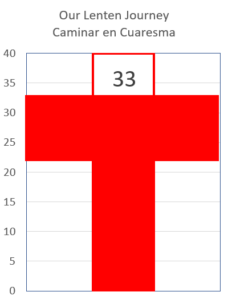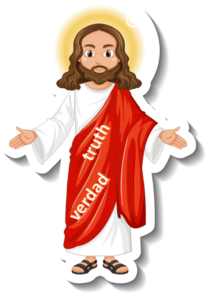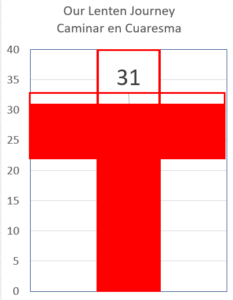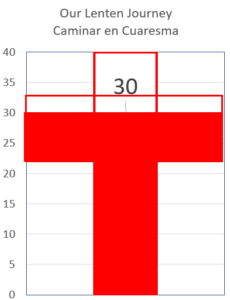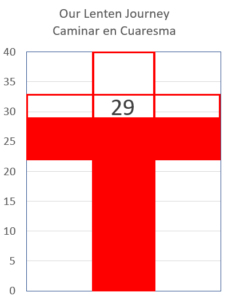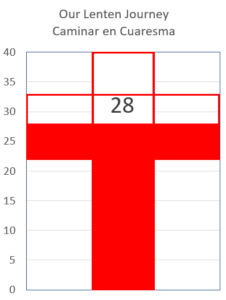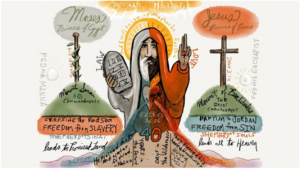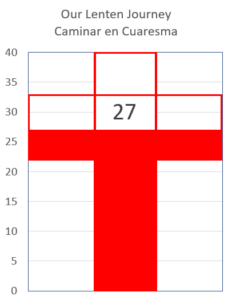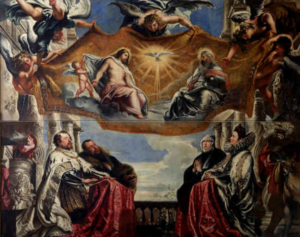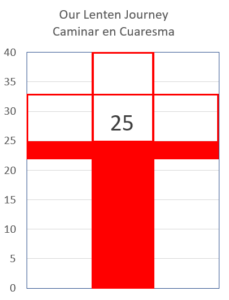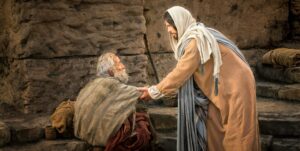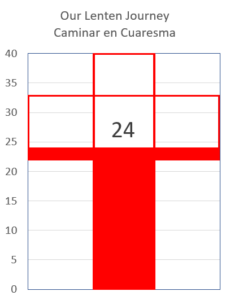
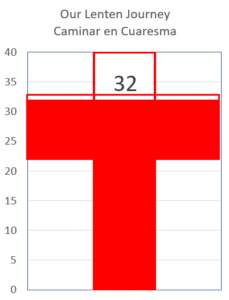
Our Lenten Journey / Caminar en Cuaresma
versión en español
Thursday – March 30 – Day 32
Living in the Moment
Jesus said to them, “Amen, amen, I say to you, before Abraham came to be, I AM.” So they picked up stones to throw at him; but Jesus hid and went out of the temple area. John 8:58–59
When Moses encountered God in the burning bush, God revealed His name: I AM. The Catechism of the Catholic Church teaches that this revelation of God’s name “is at once a name revealed and something like the refusal of a name.” It expresses that God is “infinitely above everything that we can understand or say.” He is the “hidden God.” He is also a “God who makes himself close to men” at each and every moment of our lives (See CCC #206).
In our Gospel today, Jesus identifies Himself with this hidden God. He states that He alone knows His Father and that the Father glorifies Him because He is the great I AM. To the people of that time, this was a shocking revelation, at least to those who failed to comprehend this truth in faith. But that mysterious name reveals to us not only the essence of God, it also reveals how we ought to relate to this infinite, hidden, exalted and glorious God.
As Jesus revealed His identity, He did not say, “before Abraham came to be, I was.” He says, “I AM.” This reveals that Jesus not only existed before Abraham, but that His existence transcends all time. He always and everywhere IS. Though this might seem overly philosophical to some, it is an important concept to understand for two important reasons. First, it gives us greater insight into God. But, second, it reveals to us how we ought to relate to God every day.
God is not a God of the past. He is not a God of the future. He is a God of the present moment. If we are to enter into a relationship with God, then we must realize that we can only encounter Him in the present moment. He is the Here and Now, so to speak. And we must seek Him here and now, in this present moment alone.
Sometimes we find ourselves dwelling on the past. To the extent that our past has helped or hurt us in this present moment, we need to address it. But the way this is done is by seeking God’s healing grace today, allowing the past to disappear into His abundant mercy. Other times we try to live in the future, becoming anxious about what is to come. But God does not dwell in the future for, to Him, all time is here and now. Therefore, we ought not to become anxious about the future, worry about it or try to live in it now. All we have is this present moment, and it is in this moment that God comes to meet us. He is here, and we must meet Him here, turning to Him and His grace today.
Reflect, today, upon this deep and mysterious revelation from our Lord. Think about his identity as the great “I AM.” Ponder that name. Ponder its meaning. See it as a way by which Jesus is inviting you to encounter Him in this present moment alone. Live in this moment. The past is gone; the future is not yet here. Live where God exists, here and now, for that is the only place that you will meet our Lord.
Let us pray:
My Lord, You are the Great I Am. You transcend all time. Help me to meet You today, to let go of the past, to look forward to the future, and to live with You in this moment alone. As I meet You here, dear Lord, help me to love You with all my heart.
Source: mycatholic.life
USCCB Daily Readings: bible.usccb.org/bible/readings/033023.cfm
Jueves – 30 de marzo – Día 32
Viviendo el momento
Jesús les dijo: “Amén, amén, les digo, antes que Abraham naciera, YO SOY”. Así que recogieron piedras para tirárselas; pero Jesús se escondió y salió del área del templo. Juan 8:58–59
Cuando Moisés se encontró con Dios en la zarza ardiente, Dios le reveló Su nombre: YO SOY. El Catecismo de la Iglesia Católica enseña que esta revelación del nombre de Dios “es a la vez un nombre revelado y algo así como el rechazo de un nombre”. Expresa que Dios está “infinitamente por encima de todo lo que podamos entender o decir”. Él es el “Dios escondido”. Él es también un “Dios que se hace cercano a los hombres” en todos y cada uno de los momentos de nuestra vida (Ver CIC #206).
En nuestro Evangelio de hoy, Jesús se identifica con este Dios escondido. Afirma que solo Él conoce a Su Padre y que el Padre lo glorifica porque Él es el gran YO SOY. Para la gente de esa época, esta fue una revelación impactante, al menos para aquellos que no pudieron comprender esta verdad en la fe. Pero ese nombre misterioso nos revela no solo la esencia de Dios, también nos revela cómo debemos relacionarnos con este Dios infinito, escondido, exaltado y glorioso.
Cuando Jesús reveló su identidad, no dijo: “antes que Abraham naciera, yo era”. Él dice: “YO SOY”. Esto revela que Jesús no solo existió antes de Abraham, sino que Su existencia trasciende todo tiempo. Él siempre y en todas partes ES. Aunque esto puede parecer demasiado filosófico para algunos, es un concepto importante de entender por dos razones importantes. Primero, nos da una mayor comprensión de Dios. Pero, segundo, nos revela cómo debemos relacionarnos con Dios todos los días.
Dios no es un Dios del pasado. No es un Dios del futuro. Es un Dios del momento presente. Si vamos a entrar en una relación con Dios, entonces debemos darnos cuenta de que solo podemos encontrarlo en el momento presente. Él es el Aquí y el Ahora, por así decirlo. Y debemos buscarlo aquí y ahora, solo en este momento presente.A veces nos encontramos viviendo en el pasado. En la medida en que nuestro pasado nos haya ayudado o lastimado en este momento presente, debemos abordarlo. Pero la forma de hacerlo es buscando la gracia sanadora de Dios hoy, permitiendo que el pasado desaparezca en Su abundante misericordia. Otras veces tratamos de vivir en el futuro, angustiándonos por lo que está por venir. Pero Dios no mora en el futuro porque, para Él, todo el tiempo es aquí y ahora. Por lo tanto, no debemos angustiarnos por el futuro, preocuparnos por él o tratar de vivir en él ahora. Todo lo que tenemos es este momento presente, y es en este momento que Dios viene a nuestro encuentro. Él está aquí, y debemos encontrarlo aquí, volviéndonos a Él y Su gracia hoy.
Reflexiona hoy sobre esta profunda y misteriosa revelación de nuestro Señor. Piensa en su identidad como el gran “YO SOY”. Medita en ese nombre. Medita en su significado. Míralo como una forma en que Jesús te está invitando a encontrarlo en este momento presente solo. Vive en este momento. El pasado se fue; el futuro aún no está aquí. Vive donde Dios existe, aquí y ahora, porque ese es el único lugar donde encontrarás a nuestro Señor.
Oremos:
Mi Señor, Tú eres el Gran Yo Soy. Trasciendes todos los tiempos. Ayúdame a encontrarte hoy, a dejar atrás el pasado, mirar hacia el futuro y vivir contigo en este momento solo. Mientras te encuentro aquí, amado Señor, ayúdame a amarte con todo mi corazón.
Lecturas de Hoy: bible.usccb.org/es/bible/lecturas/033023.cfm
